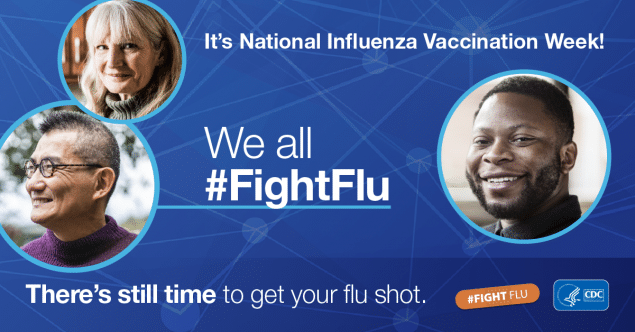The Importance of Influenza Vaccinations
This week is National Influenza Vaccination Week, and it is an important week for us at AxessPointe. The CDC estimates that in the United States the flu causes between 12,000 and 61,000 deaths each year. They also estimate that an average of at least 9 million Americans and up to as many as 45 million become infected annually, with 140,000 to 180,000 of those cases requiring hospitalization. The influenza vaccine is important to help protect yourself and others during flu season.
While some healthy adults avoid the flu completely or end up missing a handful of days of work, the flu can be especially dangerous to:
- People over 65 and those in long-term care facilities
- Infants under 6 months
- Pregnant and newly post-partum mothers
- Those with weakened immune systems
- Native Americans
- Those with chronic illnesses like asthma, diabetes and heart disease
- People whose BMI is over 40
If you fall into one of the above categories, the flu vaccine is highly recommended to protect your body from the flu and further complications or severe illness due to your current condition.
Why Should You Get the Flu Shot Annually?
Even if you don’t fall into the categories listed above, it’s important to get immunized every year to stop the spread and prevent infecting those with higher risks. During the 2016-2017 flu season, the flu vaccine prevented 5.3 million flu cases, 2.6 million doctor visits because of the flu and 85,000 hospitalizations. To avoid catching the flu and risking a doctor or hospital visit, your annual flu shot is your best chance at staying healthy. Not only does it keep you from getting infected, but you’re also doing your part in protecting the more vulnerable populations.
Flu viruses change, and new strains appear often. Even if you have had influenza or were vaccinated in the past, the changing of the virus means you may not have the immunity or antibodies to prevent infection. That is why it is recommended to get your flu shot annually.

What Else Can You Do?
While the flu vaccine is truly the best way to protect yourself against influenza, you can also prevent sickness during flu season in the following ways:
- Avoid close contact with others
- Wash your hands regularly or use an alcohol-based hand sanitizer if washing is not available
- Avoid touching your face
- Stay home if you are feeling ill
- Always cover your mouth and nose when coughing or sneezing
While the flu vaccine is the most effective way to protect yourself from the flu, taking these precautions can help in slowing the spread each year.
How to Know If You Have the Flu
If you didn’t receive a flu vaccination or if you’re worried you may have gotten the flu, the following symptoms are what to look out for.
- Fever
- Chills and sweats
- Muscle aches
- Overall fatigue
- Headache
- Cold symptoms like runny nose or a sore throat
- Vomiting and diarrhea, most common in children
Call your doctor immediately if you experience any of the following.
- Difficulty breathing and/or shortness of breath
- Chest pain
- Dizziness
- Worsening of current medical conditions
- Severe weakness or muscle pain
It is important to note that if you have the flu, you are contagious from the day before your symptoms started until about five days after they began.
The CDC recommends receiving your flu shot by the end of October each year, but if you have not gotten yours yet it’s not too late! Whether you want to take preventative measures and protect yourself and others from influenza, or you’re showing some of the symptoms listed above, AxessPointe is here to help. Please call us to schedule your flu shot at 888-975-9188.
Sources:
CDC
https://www.cdc.gov/flu/about/burden/index.html
https://www.cdc.gov/flu/prevent/actions-prevent-flu.htm
American Academy of Pediatrics
https://www.aap.org/en-us/advocacy-and-policy/aap-health-initiatives/immunizations/Pages/National-Influenza-Vaccination-Week.aspx
Mayo Clinic
https://www.mayoclinic.org/diseases-conditions/flu/symptoms-causes/syc-20351719


